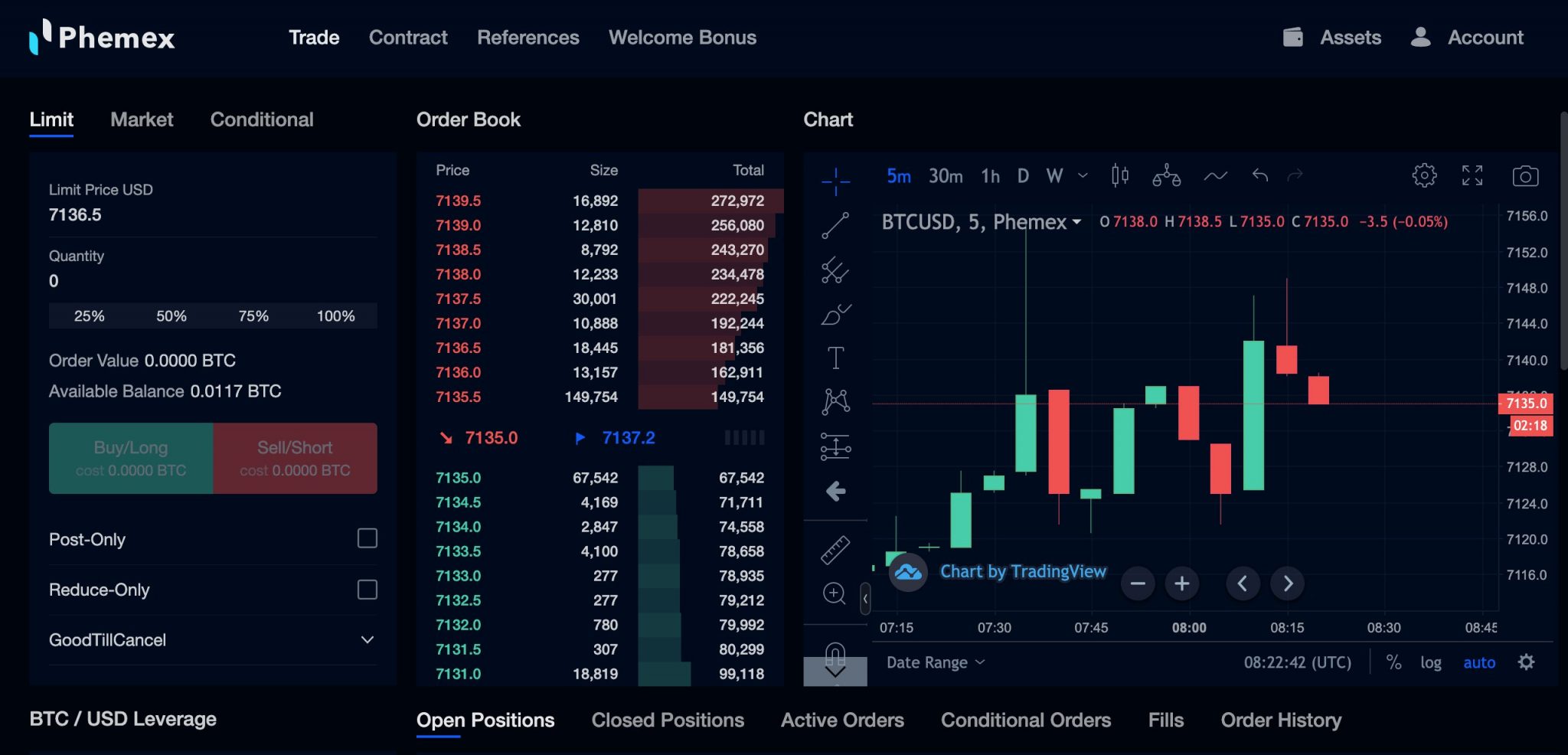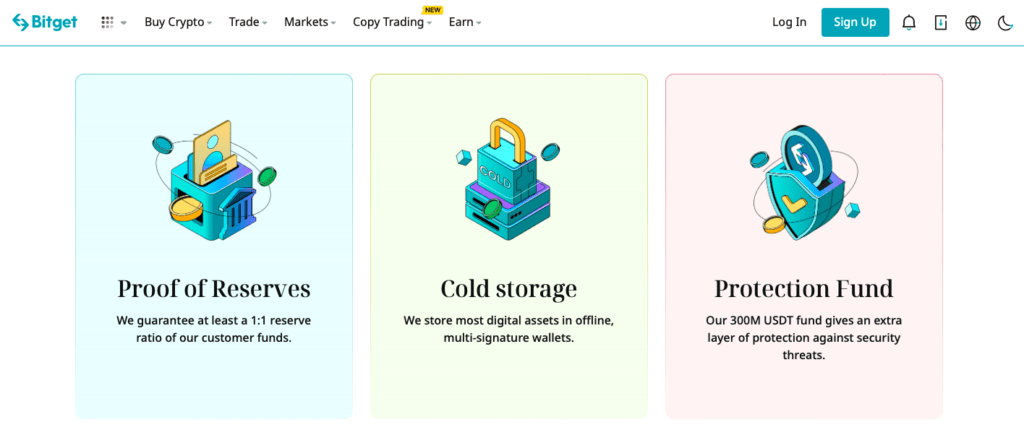This is the head-to-head comparison of Phemex and Bitget, two rising stars in crypto futures exchanges.
Both Phemex and Bitget offer a range of features to attract novice and experienced traders and enhance their trading experience.
But which one truly stands out?
In this Phemex vs. Bitget cryptocurrency exchange article, I’ll dive deep into the critical aspects of each platform.
This includes trading fees, supported cryptocurrencies, security features, and more to help you make an informed decision.
Let’s get started!
Phemex vs. Bitget: At A Glance Comparison
| Feature | Phemex | Bitget |
|---|---|---|
| Supported Cryptocurrencies | Multiple, including BTC, ETH, XRP, and LTC | Wide range, including BTC, ETH, and altcoins |
| Trading Fees | Competitive, but varies by trading volume | Competitive, but varies by trading volume and type |
| Leverage Options | Up to 100x | Up to 125x |
| Security Measures | 2FA, cold storage, encryption | 2FA, cold storage, encryption, Insurance Fund |
| User Interface | User-friendly, suitable for beginners and experts | Complex but feature-rich, geared towards experienced traders |
| Mobile App | Available for Android and iOS | Available for Android and iOS |
| Customer Support | 24/7 support via live chat and email | 24/7 support via live chat, email, and social media |
| KYC Requirements | Required for withdrawals above a certain limit | Mandatory |
| Affiliate Program | Yes, with competitive commission rates | Yes, multi-level with attractive commissions |
| Special Features | Zero-fee spot trading, educational resources | Insurance Fund, advanced trading tools |
Phemex vs Bitget: Trading Markets, Products & Leverage Offered
Phemex: A Diverse Range of Crypto Markets
First, Phemex offers diverse markets and allows users to trade spot and derivatives with up to 100x leverage.
But here’s the thing: Phemex also provides zero-fee spot trading for premium members, a feature that sets it apart from many other platforms.
Whether you’re interested in trading cryptocurrencies like Bitcoin, Ethereum, or other altcoins, Phemex provides a wide range of trading options. Also, to sign-up on the exchange you can use the Phemex Invite code to get welcome bonus.
Bitget: A Focus on Derivatives
On the other hand, Bitget focuses primarily on cryptocurrency derivatives rather than various digital assets, including Futures and Options.
This focus makes Bitget a go-to platform for successful traders looking for more complex financial products and a leverage of up to 125x.
But that’s not all.
Bitget also offers a wide range of altcoins, giving you options to diversify your portfolio and earn higher potential profits.
Phemex vs. Bitget: Supported Cryptocurrencies
Phemex: A Solid Selection
First up, Phemex offers a solid selection of cryptocurrencies for trading.
You’ll find all the big names like Bitcoin (BTC), Ethereum (ETH), Ripple (XRP), and Litecoin (LTC).
But here’s the kicker: Phemex also offers a few lesser-known altcoins, allowing you to diversify your portfolio beyond the mainstream cryptocurrencies.
Bitget: A Wider Array of Altcoins
On the flip side, Bitget offers a broader array of altcoins for crypto trading in addition to popular cryptocurrencies like BTC and ETH.
This is particularly useful if you’re looking to explore different trading opportunities.
But that’s not all.
Bitget’s focus on derivatives means you can also engage in more complex trading strategies with these altcoins.
Trading Pairs: More Than Just USD
Both Phemex and Bitget offer a variety of trading pairs, not just against USD.
You’ll find pairs against other stablecoins and cryptocurrencies, allowing traders to speculate more flexibly about their trading strategies.
This is especially useful if you want to hedge or prefer trading activities in a specific currency.
Phemex vs. Bitget: Trading Fee & Deposit/Withdrawal Fee Compared
Phemex: Competitive but With a Twist
Firstly, Phemex offers competitive trading fees based on your trading volume, starting at 0.1% for both maker and taker.
The more you trade, the lower your fees.
But here’s the exciting part: Phemex offers zero-fee spot trading for premium members.
This unique feature can be a significant advantage for traders seeking to minimize costs.
Bitget: Tiered Fee Structure
Bitget, on the other hand, also offers a competitive fee structure that’s tiered based on your trading volume and the type of trade.
Bitget charges a flat fee of 0.1 percent for spot trading in case of both maker and taker. Using Bitget’s currency ($BGB) gives you a 20% fee discount.
Futures trading and Options trading may have different fee rates.
But that’s not all.
Bitget also offers discounts for higher-volume traders, making it more cost-effective for active traders.
Deposit and Withdrawal Fees: A Closer Look
Regarding deposit fees, both Phemex and Bitget generally offer free deposits.
However, withdrawal fees can vary depending on the cryptocurrency you’re withdrawing.
Both platforms aim to keep these fees as low as possible, but checking the specific rates for each coin is essential.
Phemex vs Bitget: Order Types
Phemex: A Comprehensive Suite of Order Types
First, Phemex offers a comprehensive suite of order types to cater to novice and experienced traders.
You’ll find the basics like market orders (place an order at the current market price) and limit orders.
But here’s where it gets interesting: Phemex offers more advanced order types like stop-limit orders, trailing stops, and take-profit orders.
These advanced options give you more control over your trading strategy, allowing for good risk management and seizing opportunities more effectively.
Bitget: Specializing in Derivatives
Bitget, on the other hand, specializes in derivative trading, and its order types reflect this focus.
In addition to market and limit orders, Bitget offers conditional orders that are particularly useful for Futures and Options trading.
But wait, there’s more.
Bitget also provides iceberg and TWAP (Time-Weighted Average Price) orders designed for traders looking to execute big orders without significantly impacting the market price.
This helps when the liquidity is low for a certain token.
Phemex vs Bitget: KYC Requirements & KYC Limits
Phemex: Light KYC for Basic Features
First, Phemex offers a “light KYC” option, allowing you to access basic features without extensive verification.
You can speculate on the price, deposit, trade, and even withdraw up to a specific limit without completing full KYC.
But here’s the catch.
If you want to lift these limits or access advanced features, you’ll need to complete a more thorough verification process, which includes submitting identification documents.
Bitget: Mandatory KYC for Advanced Features
On the flip side, Bitget requires mandatory KYC verification for the platform that provides a range of features and tools and accessing advanced trading features and higher withdrawal limits.
This means submitting identification documents and possibly additional proof of residence.
But don’t worry.
The process is streamlined and usually quick, allowing you to return to the charting tools as soon as possible.
Privacy vs Regulation: A Delicate Balance
Both platforms strive to maintain a balance between user privacy and regulatory compliance.
While KYC may seem like a hurdle, ensuring the platform’s integrity and security is necessary.
Rest assured, both Bitget and Phemex offer security measures to protect your information during the KYC process.
Phemex vs Bitget: Deposits & Withdrawal Options
Phemex: Multiple Deposit Options
First, Phemex offers multiple payment methods for deposit options, including bank transfers and cryptocurrency deposits.
But here’s the best part.
Phemex also supports deposit methods of credit and debit cards, making it an incredibly convenient user experience for those who want to quickly move fiat currency into the platform.
Bitget: Crypto-Focused Deposits
Bitget, on the other hand, is more focused on cryptocurrency deposits.
While it doesn’t offer as many fiat deposit options as Phemex, it does support a wide range of cryptocurrencies.
This is particularly useful if you want to trade a diverse portfolio of coins other than the major cryptocurrencies.
Withdrawal Speed: Get Your Funds When You Need Them
Phemex and Bitget offer a speedy withdrawal transaction, usually processed within 24 hours.
However, the speed may vary depending on the cryptocurrency and network load.
You should note that both platforms have 2FA (two-factor authentication) as a means of making sure that it is the user of the account that is initiating the request.
Fees: Keep an Eye on the Costs
As for withdrawal fees, both platforms aim to keep low fees as much as possible.
Phemex generally has a flat fee for cryptocurrency withdrawals, while Bitget’s fees may vary depending on the coin.
Checking these fees before initiating a withdrawal is essential to avoid surprises.
Phemex vs Bitget: Trading & Platform Experience Comparison
Phemex: User-Friendly and Intuitive
First, Phemex offers a user-friendly and intuitive interface suitable for beginners and experienced traders.
The platform provides a clean layout, easy navigation, and quick access to essential features.
But here’s the kicker: Phemex also offers educational resources and tutorials for the crypto exchange, making it easier for newcomers to get up to speed. To know how to trade on the exchange, you can check this guide on how to short Bitcoin on Phemex.
Bitget: Feature-Rich but Complex
On the other hand, Bitget offers a feature-rich but somewhat complex interface.
It offers advanced trading tools, charts, and indicators, making it a paradise for experienced traders looking to dabble in perpetual contracts or margin trading, including spot trading.
But wait, there’s more.
Bitget also offers a customizable workspace, allowing you to tailor the platform to your trading needs.
Phemex vs. Bitget: Customer Support
Phemex: 24/7 Support with Multiple Channels
First, Phemex offers 24/7 customer support through multiple channels, including live chat and email.
But here’s the best part: Phemex also has a comprehensive FAQ section and educational resources to help you troubleshoot issues independently.
This means you can also receive answers to your questions without contacting support.
Bitget: Round-the-clock Support Plus Social Media
On the other side, Bitget offers 24/7 customer support but goes further by assisting social media channels like Telegram and Twitter.
But wait, there’s more.
Bitget’s support team is known for quick response times, often resolving issues in minutes.
Language Support: Catering to a Global Audience
Phemex and Bitget offer customer support in multiple languages, catering to a global audience.
This is particularly useful if English is not your first language and your hard-earned money is at stake, as you can get assistance in a language you’re comfortable with.
Phemex vs. Bitget: Security Features
Phemex: Multi-Layered Security Measures
First up, Phemex employs a multi-layered approach to security.
It offers two-factor authentication (2FA) for account access and withdrawals, a must-have feature.
But here’s where it gets interesting.
Phemex also uses a multi-signature cold wallet to store most user funds, minimizing the risk of a hacker accessing it.
Bitget: Insurance Fund and More
Bitget, on the other hand, not only offers 2FA and cold storage but features an Insurance Fund.
This fund is designed to cover any remaining losses in the event of liquidation, providing traders an extra layer of security.
But that’s not all.
Bitget also employs encryption protocols like SSL to secure data transmissions, adding another layer of protection and similar features offered by Phemex.
Is Phemex Safe & Legal To Use?
First, Phemex is a registered and regulated platform adhering to international laws and regulations as of 2023.
This means it’s fully legal to use in jurisdictions where cryptocurrency trading is permitted.
But here’s the kicker.
Phemex employs a range of security features, including two-factor authentication (2FA) and cold storage for most user funds.
But wait, there’s more in this Bitget vs. Phemex comparison.
Phemex also undergoes regular security audits and updates to stay ahead of potential threats.
User reviews generally indicate high trust in the platform’s security measures.
Is Bitget Safe & Legal To Use?
First, Bitget is regulated, complying with international financial laws and regulations.
This makes it a legal platform in most jurisdictions where cryptocurrency trading is allowed.
But here’s the exciting part: Bitget goes above and beyond with its security features.
It offers two-factor authentication (2FA), cold storage for user funds, and an Insurance Fund to cover potential losses from liquidations.
And there’s more.
Bitget regularly updates its security protocols and undergoes audits to ensure high security.
User reviews often highlight the platform’s robust security measures, adding an extra layer of trust.
Phemex vs. Bitget Conclusion
So, you’ve made it to the end of this comprehensive comparison.
You’re probably wondering which platform you should choose: Phemex or Bitget.
Let’s wrap it up.
Both crypto derivatives exchanges offer robust security features, making them safe and legal options for trading cryptocurrencies.
But here’s the thing: your choice ultimately depends on your specific trading needs and preferences.
Phemex shines with its user-friendly interface and low trading fees for spot trading for premium members.
On the other hand, Bitget offers a derivative product that allows traders a lot of choice and an Insurance Fund for added security.
Learn how does Phemex & Bitget stack up against the competition:




